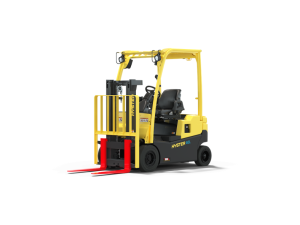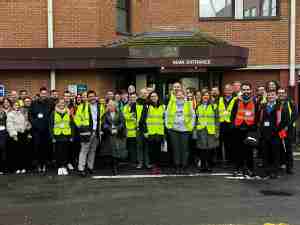Performance Team – A Maersk Company continues to integrate end-to-end cold chains with the announcement of a new cold storage facility planned for Charleston, South Carolina to serve imports and exports, opening in Q1 2023.
“We have been evaluating South Atlantic cold chain market opportunities for the past three years – and this opportunity stood out in a strong way for a number of good reasons. The South Atlantic is one of the fastest growing areas in the nation and we see lots of business opportunities – thanks to a competitive port that we can connect our logistics and services to with all our brands here Maersk, Hamburg Sud and Sealand. We see the Port of Charleston as a fast-growing deepwater port that has expanded to meet future growth with strong CEO leadership in Barbara Melvin and this has influenced our investment, site selection and long-term plans,” said Mike Meierkort, Head of Logistics and Services for Maersk North America during the August 3rd groundbreaking ceremony.

Charleston is a very concentrated port from a commodity perspective with the top two, protein and frozen fruits/vegetables accounting for 77% of all 2021 reefer food volume. Protein is the dominant commodity, making up 66% of all 2021 reefer food volume and 83% of all food exports. Within, protein, 60% is poultry, 31% is pork and 9% is beef. Frozen vegetables and fruit made up 11% of total 2021 reefer food volumes.
“We are thrilled to see RL Cold invest in a cold storage facility in Berkeley County. This would not be possible without Maersk’s support as the operator of the facility. We are honored that Maersk, a global leader in shipping, is further demonstrating its commitment to South Carolina with this facility. South Carolina Ports has the capacity to support more refrigerated and frozen goods, and we look forward to growing the cold chain business segment together,” said South Carolina Ports Authority CEO Barbara Melvin.
The strong population growth near Charleston (the U.S. Southeast where Charleston is located is the fastest growing region, 25% faster than the 2nd fastest region, the West) gives importers the incentive to increase imports into Charleston, both fresh and frozen (seafood, imported proteins, etc.). The new site will reach 80 million consumers within one day and 225 million consumers within two days.
The new facility will offer a truly unique value proposition to customers through supply chain simplification benefits by integrating cold storage solutions with ocean transit and drayage, refrigerated inland trucking, blast/quick freezing, USDA meat inspections, boxing/repacking, and other value-added services based on customer needs.
Customer interest in the Maersk-operated cold storage facility has been very strong. “Customers are looking for more cold storage space in Charleston to grow their exports to the destinations the Port of Charleston serves. There’s a strong refrigerated market in poultry, pork, beef, seafood and potential for fruits and vegetables too. We are creating the capacity needed in the market to handle fresh produce, with multiple chambers designated for the different seasons and commodities. We will have a 20,000 square foot repack room designated for value-added service to the retail sector. We will be a one stop shop for the temperature-controlled products going to the grocery sector,” said Diogo Lobo, Head of Cold Chain Logistics and Services for Maersk North America.
Having the right partners in a high growth market is important to the company’s integrator strategy. RL Cold is the cold storage developer and Primus is the Charleston-based builder specializing in cold storage construction. Equally important, the South Carolina Dept. of Commerce, Berkeley County Economic Development agency, Berkeley County Council and Port of Charleston were all instrumental in the project’s site selection and attractiveness.
The new site will comply with Maersk’s Global cold storage building sustainability standards. It will be certified LEED Gold and have rooftop solar, a CO2 cascade refrigeration system, LEDs and smart lighting, low-flow water devices, rainwater recapture, electric car charging, and use a virtual power purchase agreement for clean power to offset any grid power consumption.











